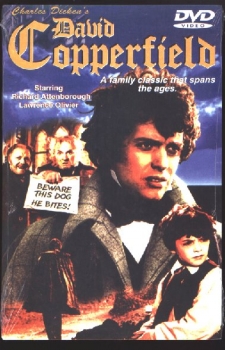
DAVID COPPERFIELD
UK, 1970, 118 Minutes, Colour.
Robin Phillips, Susan Hampshire, Edith Evans, Michael Redgrave, Ralph Richardson, Wendy Hiller, Corin Redgrave, Pamela Franklin, Ron Moody, James Donald, Emlyn Williams, Laurence Olivier, Richard Attenborough, Megs Jenkins, Anna Massey, Cyril Cusack.
Directed by Delbert Mann.
David Copperfield is one of Charles Dickens most popular works. There have been several film versions, the most famous of which was the 30s version directed by George Cukor. W.C. Fields was Mr. Micawber in that version. This particular film was made for the Dickens centenary, a colour version designed for American television but for cinema release throughout the world. However, it is merely a sketchbook of the characters (admittedly with the cream of English actors), and it would be a competent, easy introduction to the book, to Dickens' own life and his version of the world. However, the film's screenplay tends to remain on the surface of things and skims lightly over the characters and the events. It was directed by Delbert Mann who also made a version of Jane Eyre and Kidnapped for the same producers.
1. The audience approach to a classic? Its expectations of a Dickens film? What are they and how were they fulfilled?
2. Is this film a film version of the novel, or an illustration of the novel? The limitations of an illustrated work? The illustrations during the credits sequences?
3. The film was made for television. Is this obvious? The large number of prestige British stars? The episodic nature of the film? Use of colour, locations, close-ups? Did this detract from the overall impact?
4. The importance of the structure of the film: its reference to the novel, the autobiographical form, the role of memory, the tangle of memory and motives, the continual fluidity from present to past? How confusing for the audience? How dramatically telling?
5. The first impressions of David? As an adult, melancholy walks along the beach, looking at the moods of the sea, the music, Agnes coming to meet him? Did this influence the response to the flashbacks?
6. Did the film offer an explanation of what made David the person he was? Was he the hero of his own life? His strengths and weaknesses? What heroism was there in his life?
7. The impact of his father's death and his mother's remarriage? The cruelty of Mr. Murdstone and his sister? Were they caricatures of savagery? His grief and their harshness? The beatings? Murdstone's sending him to work? The harshness of the work? His escaping from the work?
8. David's education and the presentation of 19th century schools? The two eccentric characters in charge of the school? The interviews with David, the meeting with the boys, the punishments, the talks in the refectory, Steerforth and his talk to the head of the school? What effect on David?
9. The importance of Aunt Betsy and Mr. Dick and their influence on David? Aunt Betsy receiving him when he ran away? Her eccentricities? Her reliance on Mr. Dick's advice? Mr. Dick and kindly simplicity with his kite? The importance of their continuing their interest in him when he was at work? Their part in the exposure of Uriah Heep? Aunt Betsy's continuing concern for David and her summoning Agnes at the end? How sympathetic a character was Aunt Betsy?
10. The portrayal of the Wakefields and their status? Business family and prestige? Agnes and her friendship with David? Her love for him and her acceptance of his engagement to Dora? Uriah Heep and his position with the Wakefields? His insinuations, his overdone courtesy, his mock humility? How annoying was he? His ingratiating himself into the family, taking it over, keeping a record of his misdemeanours? How sad were people when he received his humiliation? How cruel was he for instance to Mr. Micawber? The moral of the story about Heep and his downfall?
11. How attractive were the Micawbers? Mr. Micawber and his sense of irresponsibility? Mrs. Micawber and her busyness with the family? Micawber's loyalty to David, his irritation with Heep, his causing Heep's downfall? The migration to Australia?
12. The influence of the Peggottys on David's life? Mrs. Peggotty and her kindness? Peggotty and his interest in David, the anguish about Emily and Steerforth? The kindliness of Barkis and his continued presence there? The importance of the introduction of Steerforth and his attracting Emily away from Ham? The pathos of Emily's downfall? Her being rescued by Peggotty after his search? The irony of Steerforth's death? How well was this subplot developed? How interesting? As a reflection of 19th century manners and morals? The influence on David?
13. David's love for Dora? How genuine? The marriage itself and Dora's inability to manage? David's irritation? The untimeliness of her death and its effect? Aunt Betsy's comment that the marriage would not have lasted?
14. The happy ending for all those who migrated to Australia?
15. David and his having to cope? Purge himself of his memory and guilt? Rely on the support of Agnes?
16. How interesting a picture of 19th century manners, morals, social observation?
17. How well did the film explore the values of an individual, family, education, wealth, love?